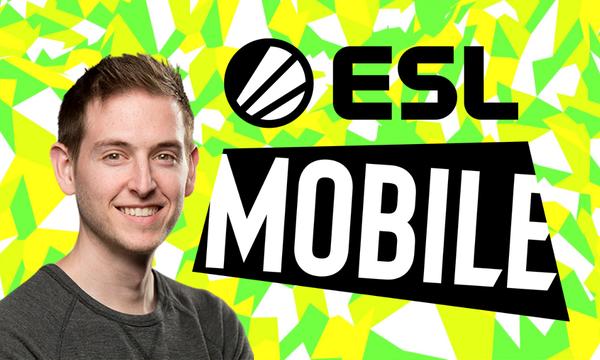
“Esports 2.0”: Discussing ESL Gaming’s mobile esports ambitions
In 2021, esports expanded. Viewership figures continued to rise, and esports entities diversified across the sector in order to maximise potential.
This led to a rise in cryptocurrency partnerships, metaverse conversations and global expansions. However, one topic perhaps most emphasised was mobile esports.
Major esports player ESL Gaming identified this trend and in March last year, the tournament organiser launched a new mobile esports ecosystem covering North America, Europe/MENA, and Asia-Pacific.
To delve into the emergent rise of mobile esports in the West, Esports Insider spoke toKevin Rosenblatt, the General Manager of Mobile at ESL Gaming.
RELATED: Riot Games unveils new Wild Rift regional leagues and Icons Global Championship
“In order for mobile esports to be successful, there has to be the right foundation for casual players to play, but then there has to be that next step,” Rosenblatt explained.
Creating a sustainable pyramid within mobile esports has been a goal for ESL Gaming since it debuted its mobile initiatives in 2018. Since then, the tournament organiser launched a multitude of projects before establishing its new mobile esports ecosystem in 2021. For Rosenblatt, creating a ‘zero-to-hero’ path for mobile players in the West is integral.
“I think one of the key things is that the West needs to develop great players and great teams and they need the opportunity to do that,” he said. “If we’re able to create an infrastructure where the West can have these heroes and stars, the viewership is going to follow.”
When discussing what the future of mobile esports in the West will look like, heads immediately turn to Eastern regions. However, Rosenblatt highlights that this isn’t just the case for the mobile sector — the East showcases the future success of esports as a whole.
As such, it is important to learn from the East in order to establish Western principles for potential mobile esports ecosystems. Moreover, ESL Gaming hopes that its own development within mobile esports could reduce the East vs West divide that has been developing between certain titles, such as Mobile Legends: Bang Bang’s prominence in SEA.
“I think our vision for the future is that game titles start to become more global in nature, versus the sort of segregation between the East and West,” said Rosenblatt. However, in order to achieve this, responsibility must also be put on the publishers. “There’s a lot that’s controlled by the publishers of those titles. How they enter a market, how they market the game, the ease of access for players, the type of hardware that’s required to play.”
Nevertheless, tournament organisers are still looking to lay the groundwork for mobile esports. Rosenblatt claimed ESL has invested ‘millions of dollars’ into developing a competitive and casual mobile esports ecosystem, with even more projects planned for 2022. Whilst he couldn’t reveal exact details, Rosenblatt alluded to an ESL Mobile ‘master’s programme’, set to be tailored towards mobile titles that have a greater depth of ‘competitive experience’.
“2022 is going to be the year to complete our competitive ecosystem,” he said. “We’ve sort of taken a little bit of a crawl, walk, run approach to make sure that we’re doing things correctly.”
Other goals that ESL Mobile looks to accomplish this year include expanding its geographical reach, increasing prize pools, and putting an emphasis on content.

RELATED: Jordan Bellar departs G2 Esports to join Tribe Gaming
When ESL Mobile’s new ecosystem was announced, the omission of a LATAM section was seen as a surprise to many mobile esports fans. Widely regarded as the West’s largest mobile esports hotspot, Rosenblatt has assured that LATAM “ is an area that we’re taking a very, very close look at.”However, he continued: “One thing that we don’t want to do is just copy and paste what we have in Europe or Asia and say this is going to work in Latin America. What we’ve always wanted to do is try to create a differentiated offering to create something really special and great for a local audience. That’s a little bit of a puzzle piece that we’re trying to figure out right now.”
It isn’t just selecting the correct regions that goes through Rosenblatt’s mind when creating effective esports ecosystems; the right titles count as well. ESL Gaming’s General Manager of Mobile noted that the team looks at ‘seven or eight’ different factors per title when deciding which to game utilise.
When selecting a title, ESL’s criteria takes into account regional popularity and competitiveness to player growth. According to Rosenblatt, the tournament organiser utalises these dimensions to stat rank every title before final decisions are made as to what title is used.
It is also imperative that the title matches the correct programmes. As of right now, titles entering into ESL’s ecosystem can fit into the ESL Mobile Open, which tailors towards a casual-competitive experience; or the ESL Mobile Challenge, the tournament organiser’s esports-focused programme.
In particular, he highlighted the inclusion of mobile racing game Asphalt 9 as a perfect example of a title that is an ideal fit for ESL Mobile’s open programme, due to its ever-growing casual player base.
When asked what mobile esports titles Rosenblatt is excited to see develop in 2022, Brawl Stars and Clash of Clans (two games featured in last year’s ESL Mobile ecosystem) were named. However, he also emphasised his excitement for Plarium’s Mech Arena and upcoming mobile adaptations of PC titles.
“There’s this next generation of titles which have competitive features built into them. I think a great example is Mech Arena,” he said. “We don’t have any current plans in the pipeline to support it. But we’re constantly looking at these types of titles.
“It’s also an amazing signal that publishers are taking their traditional titles and adapting them to mobile.”
RELATED: Esports on smartphones: The future of the industry?
Rosenblatt’s enthusiasm for mobile esports’ potential in the West is clear as day. As the scene gains more popularity within the hemisphere,the potential to unlock greater opportunities follows — not just from a competitive standpoint but across broadcasts and content.
“I do think mobile esports is going to be in some ways kind of esports 2.0,” highlighted Rosenblatt. “On the digital side, there will be better connected experiences because you have a phone in your pocket that you’re interacting with. Everything from the content that we create to the type of esports experience that you have, needs to be optimised for that medium, which is very, very different than traditional esports.
“From a live event perspective, there is so much that mobile technology can do, from untethering players from the stage to creating a better, more intimate experience with the fans.”
ESL Gaming has major ambitions for the mobile esports space. The tournament organiser looks to establish a competitive ecosystem for the sector in ESL Mobile, and has even detailed its intentions to host LAN events, COVID-permitting.
Similar to traditional esports, every mobile title has its own intricacies when creating competitive structures. However, having an established name like ESL being on board to team up with publishers will undoubtedly help.
As Rosenblatt said: “We’ve learned an incredible amount, and we try to take the lessons of 20 years of building and structuring competitive ecosystems. I mean, that’s what ESL does at its core, right?”
Sign up to our ESI Dispatch Newsletter
}})